Trip hop is a musical genre that originated in the early 1990s in the United Kingdom, especially Bristol. It has been described as a psychedelic fusion of hip hop and electronica with slow tempos and an atmospheric sound, often incorporating elements of jazz, soul, funk, reggae, dub, R&B, and other forms of electronic music, as well as sampling from movie soundtracks and other eclectic sources.

Camper Van Beethoven is a 1986 album by musical group Camper Van Beethoven, released on Pitch-A-Tent. With the six then CVB members joined in the studio by acid-folk eccentric Eugene Chadbourne, the album is arguably the zenith of the band's musical experimentation, with surreal lyrics, backwards, sped-up and slowed down parts; a portion of the track "Stairway To Heavan" is itself a musical palindrome. A great number of ethnic instruments are used in addition to the usual violin parts played by member Jonathan Segel; the album also features pedal steel, banjo, tablas and sitar.
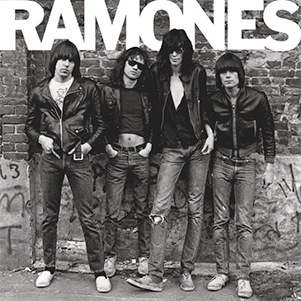
Ramones is the debut studio album by American punk rock band the Ramones, released on April 23, 1976, by Sire Records. After Hit Parader editor Lisa Robinson saw the band at a gig in New York City, she wrote about them in an article and contacted Danny Fields, insisting that he be their manager. Fields agreed and convinced Craig Leon to produce Ramones, and the band recorded a demo for prospective record labels. Leon persuaded Sire president Seymour Stein to listen to the band perform, and he later offered the band a recording contract. The Ramones began recording in January 1976, needing only seven days and $6,400 to record the album.
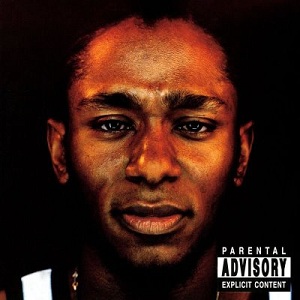
Black on Both Sides is the debut solo studio album by American rapper Mos Def, released on October 12, 1999, by Rawkus and Priority Records. Prior to its recording, Mos Def had collaborated with Talib Kweli for the album Mos Def & Talib Kweli Are Black Star in 1998, which raised high expectations for a solo effort by the former. Black on Both Sides features an emphasis on live instrumentation and socially conscious lyrics.
Utah Saints are an English electronic music duo comprising members Jez Willis and Tim Garbutt. The band had three top-ten and another five top-40 singles on the UK Singles Chart in the 1990s, as well as number-one dance tracks in the UK and US. They were notable for pioneering use of sampling technology, in particular, their practice of manipulating samples from mainstream pop, rock, R&B and soul songs and combining them with contrasting dance beats, using the samples in a new context. The band wrote, produced and mixed all of their own music. The duo were joined on stage by additional musicians when they played live from 1991 to 2001. They were one of the first electronic groups to play as a live collective and supported both the Shamen and U2 live at 10 stadium shows. Since then the duo have performed live sets themselves.

Leave Home is the second studio album by American punk rock band the Ramones. It was released on January 10, 1977, through Sire Records, with the expanded CD being released through Rhino Entertainment on June 19, 2001. Songs on the album were written immediately after the band's first album's writing process, which demonstrated the band's progression. The album had a higher production value than their debut Ramones and featured faster tempos. The front photo was taken by Moshe Brakha and the back cover, which would become the band's logo, was designed by Arturo Vega. The album spawned three singles, but only one succeeded in charting. It was also promoted with several tour dates in the United States and Europe.
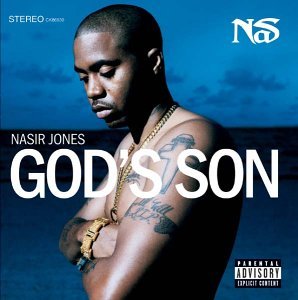
God's Son is the sixth studio album by American rapper Nas. It was released on December 13, 2002, by Ill Will and Columbia Records. Production took place during 2001 to 2002, and was handled by several producers, including Salaam Remi, Chucky Thompson, Ron Browz, Eminem, and The Alchemist. Partly inspired by Nas' feud with Jay-Z and the death of his mother in early 2002, God's Son covers lyrical themes such as religion, violence, and his own emotional experiences. It has been recognised by critics as some of Nas' most personal work.

Fun House is the second studio album by American rock band the Stooges. It was released on July 7, 1970, by Elektra Records. Though initially commercially unsuccessful, Fun House developed a strong cult following. Like its predecessor and its successor, it is generally considered integral in the development of punk rock.

Up on the Sun is the third album by the Meat Puppets, released in 1985 by SST Records. The album features a cleaner and more technical sound with a more psychedelic rock feel, in contrast to the sloppy punk approach of their first album (1982), while continuing with the mystical, poetic lyrics and country-inflected songwriting of Meat Puppets II (1984).

ESG is an American rock band formed in the South Bronx in 1978. ESG has been influential across a wide range of musical genres, including hip hop, and dance-punk. The band's track "UFO" is one of the most sampled songs in history.

Storm the Studio is the debut album by English electronic music group Meat Beat Manifesto, released on 20 February 1989 by Sweatbox Records in the United Kingdom and later that year by Wax Trax! in the United States. Recorded in three recording studios, the album contains four compositions, each split into separate parts, that mostly originated as twelve-inch singles the band released in 1988. The record's inventive musical style features elements of industrial music, electro, dub, noise rock and hip hop music, and incorporates breakbeats, noise and sporadic rap vocals. The group also incorporated heavy usage of sampling in a fashion they compared to pop art. Television was a further influence on the record, and numerous items of television dialogue appear throughout Storm the Studio as samples.

Utah Saints is the self-titled debut album by British electronic band Utah Saints. It was released in the United States in 1992 on London Records, and in 1993 the album was released in the United Kingdom on FFRR, featuring a different track listing, cover, and two additional songs. The album reached number 10 on the UK Albums Chart; singles released from this album include "Something Good", "I Want You", and "What Can You Do for Me".

Out My Way is an EP by the alternative rock band the Meat Puppets, released in 1986. It features a more hard rock-oriented sound than on previous releases, leading some critics to say that the sound is similar to the southern/hard rock stylings of ZZ Top. The EP was reissued in 1999 by Rykodisc, with additional bonus tracks.
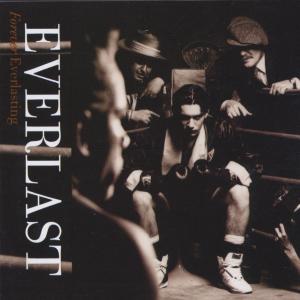
Forever Everlasting is the debut solo studio album by American recording artist Everlast. It was released on March 27, 1990 via Warner Bros. Records. The eleven track full-length album features a remix song of his 1988 single "Syndication", and singles "Never Missin' a Beat", "The Rhythm" and "I Got the Knack". Single "The Rhythm" featured guest appearances from his Rhyme Syndicate bandmates Donald D and Ice-T, as well as an early appearance from the Brand New Heavies singer N'Dea Davenport who is credited as "Diva", and "I Got the Knack" featured scratches provided by DJ Lethal, whom he would later join to form House of Pain.
"Going Away to College" is a song by American rock band Blink-182 from the band's third studio album, Enema of the State (1999). It examines themes of heartbreak and lovesickness. It was written primarily by bassist Mark Hoppus, and credited to both he and guitarist Tom DeLonge. Hoppus writes from the perspective of an adolescent boyfriend, young and in love. He wrote the song remembering how graduating high school can cause relationships to fracture, as both individuals move on to attend separate universities. It was inspired by the teen movie Can't Hardly Wait (1998).
Nu-disco is a 21st-century dance music genre associated with a renewed interest in the late 1970s US disco, synthesizer-heavy 1980s European dance music styles, and early 1990s electronic dance music. The genre was popular in the early 2000s, and experienced a mild resurgence in the 2010s.
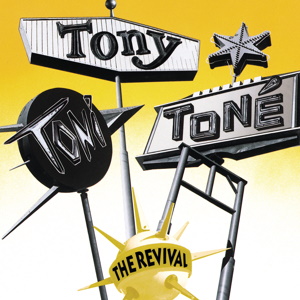
The Revival is the second studio album by American R&B band Tony! Toni! Toné!, released on May 8, 1990, by Wing Records. It was produced and arranged primarily by the band, although they were assisted on a few songs by the production duo Foster & McElroy, who had produced their first album, Who? (1988). The band recorded at several studios in California with the assistance of the Synclavier, an early music workstation.

The Wack Album is the third studio album by American comedy hip hop group The Lonely Island. Recorded in Los Angeles and New York City with producers including TODAY, DJ Nu-Mark and Asa Taccone, it was released on June 7, 2013 by Republic Records. The album reached number ten on the US Billboard 200 and topped the Comedy Albums and Rap Albums charts. "3-Way ", "YOLO", "Spring Break Anthem", "I Fucked My Aunt", "Diaper Money", "Semicolon", "Go Kindergarten" and "Spell It Out" were released as singles.
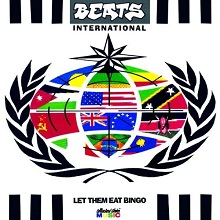
Let Them Eat Bingo is the debut album by British electronic project Beats International, released in spring 1990 on Go! Beat in the United Kingdom and Elektra in the United States. The project was founded and led by disc jockey and former Housemartins bassist Norman Cook, who produced the album alone and intended Beats International to be a collective of permanent and temporary members including singers and other performers. Cook is joined on the album by a host of contributors, including Lindy Layton, Billy Bragg, Double Trouble, and Captain Sensible.
"Why They Hide Their Bodies Under My Garage?" is a song by the English disc jockey and techno music producer Blawan on 25 August 2012 as the lead single on the four track 33+1⁄3 rpm vinyl EP His He She & She on Hinge Finger records. It became an underground dance music hit, regarded for its heavy 4/4 bass-drum beat, minimalist instrumentation and its prominent vocal line sampled from a 1996 Fugees song.















